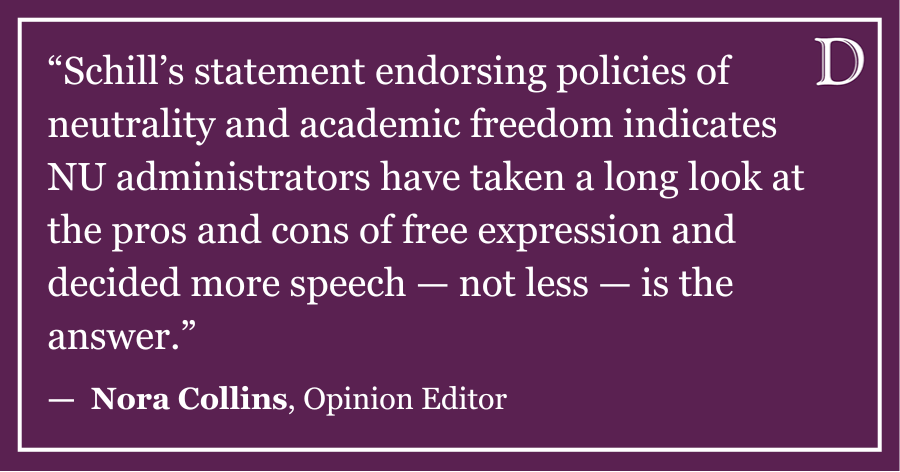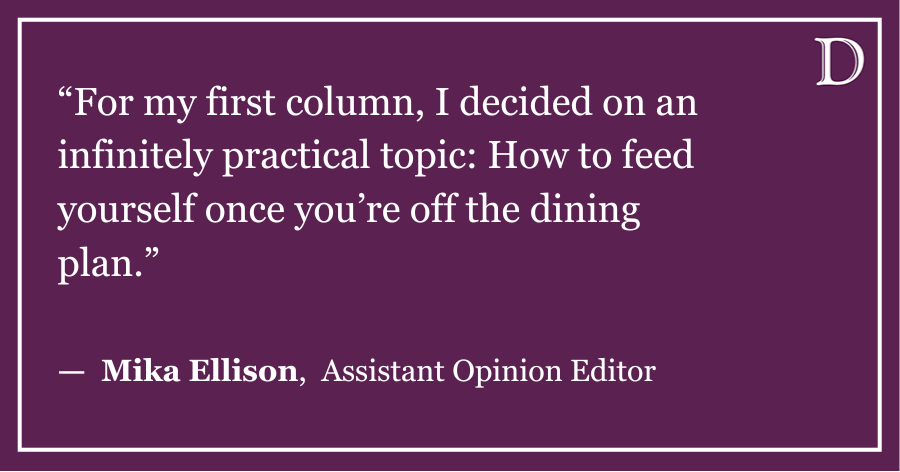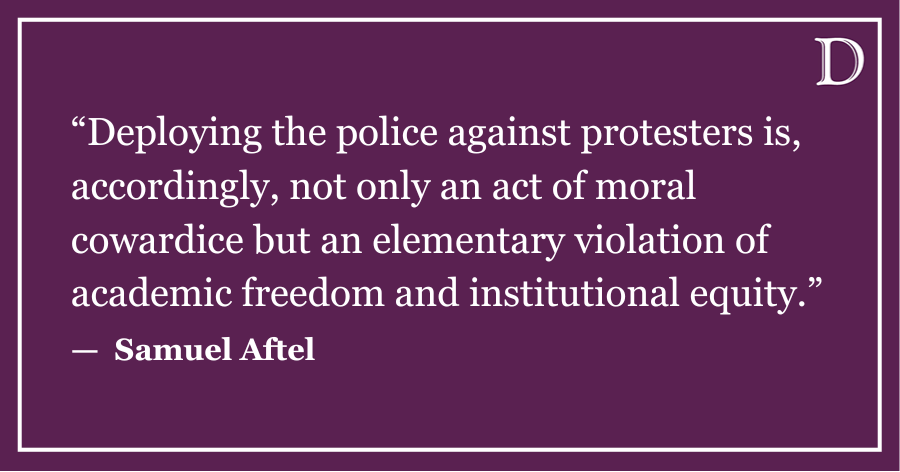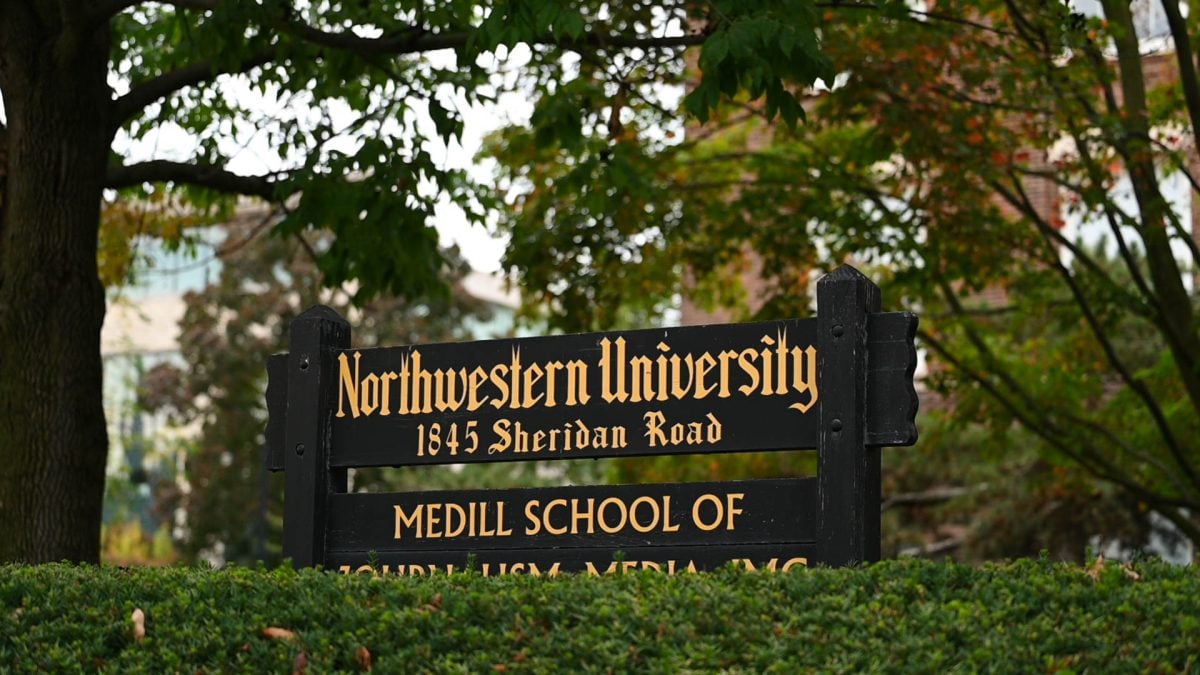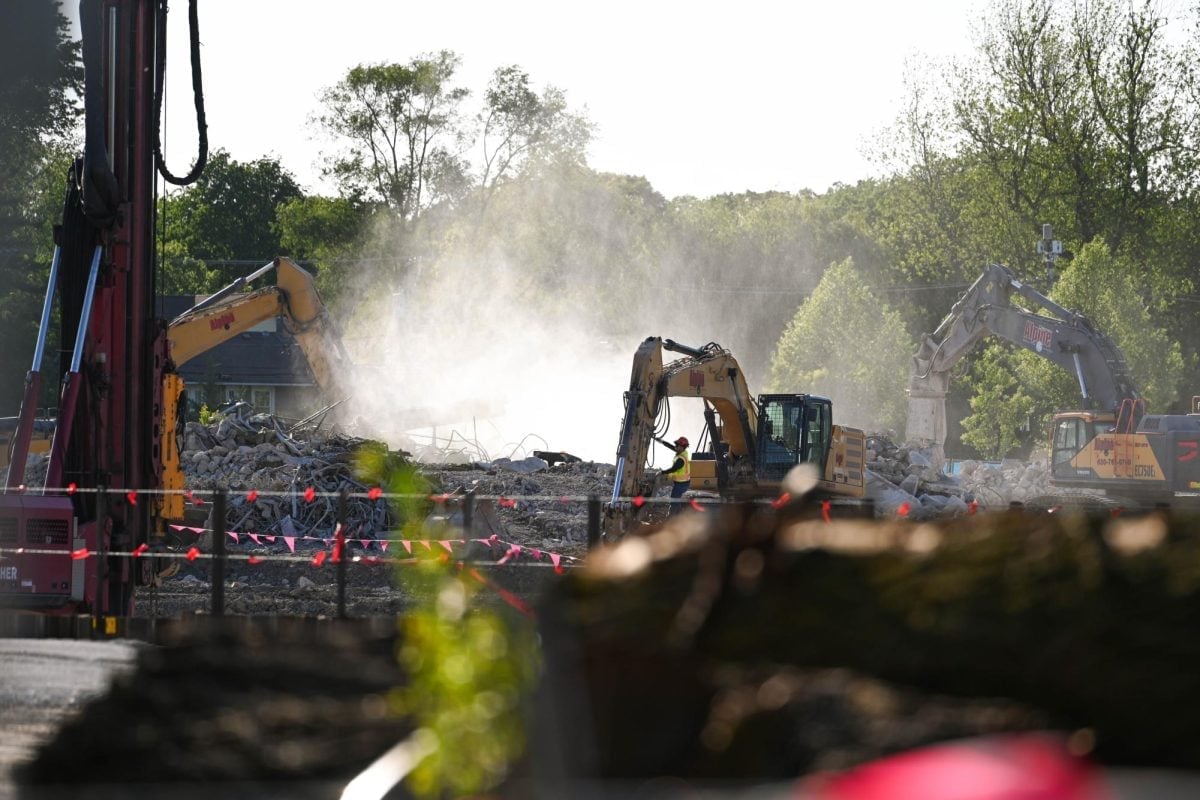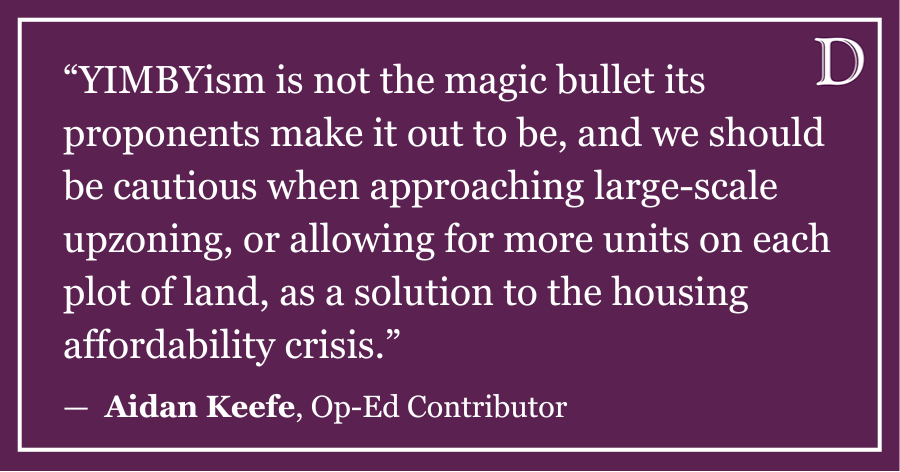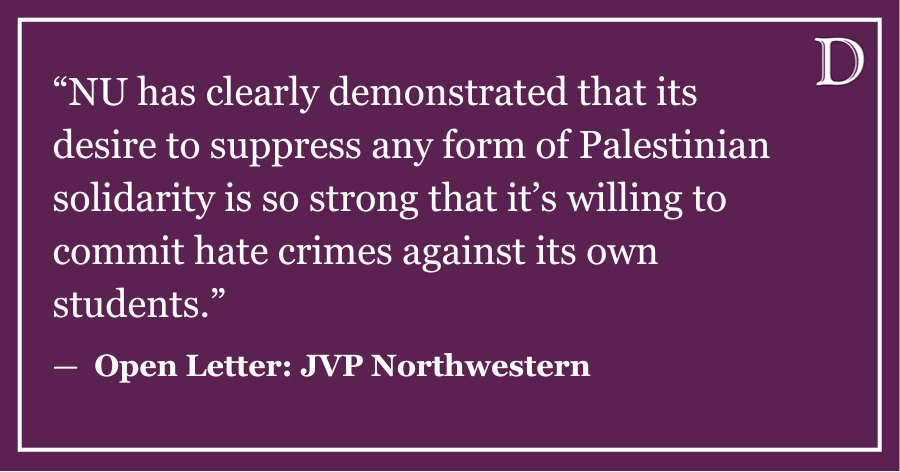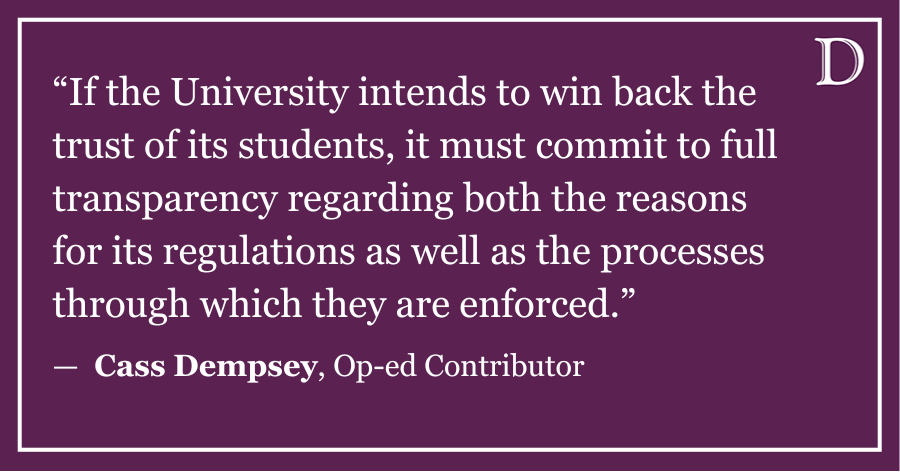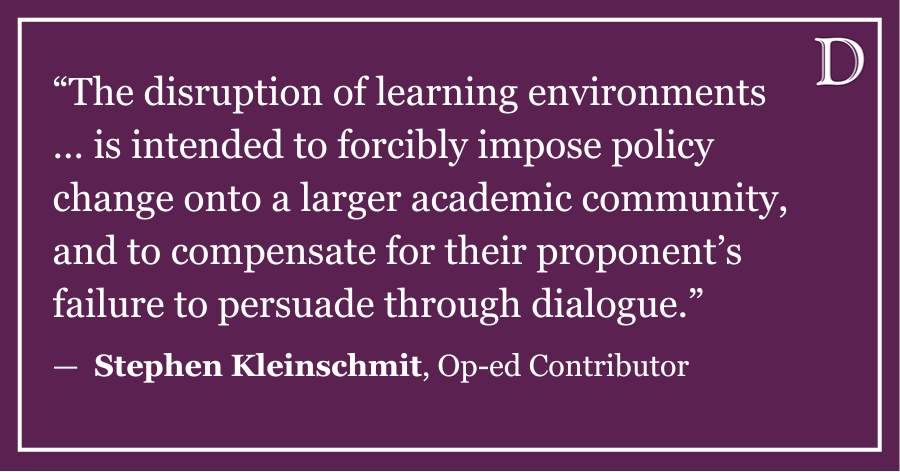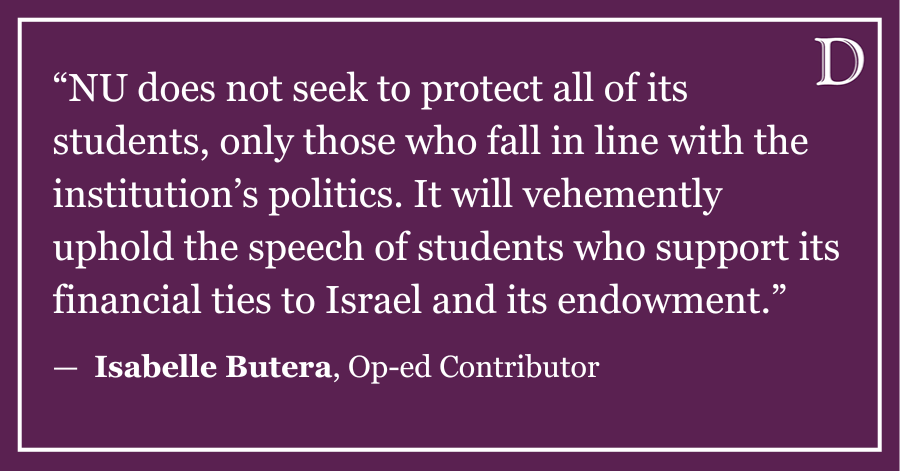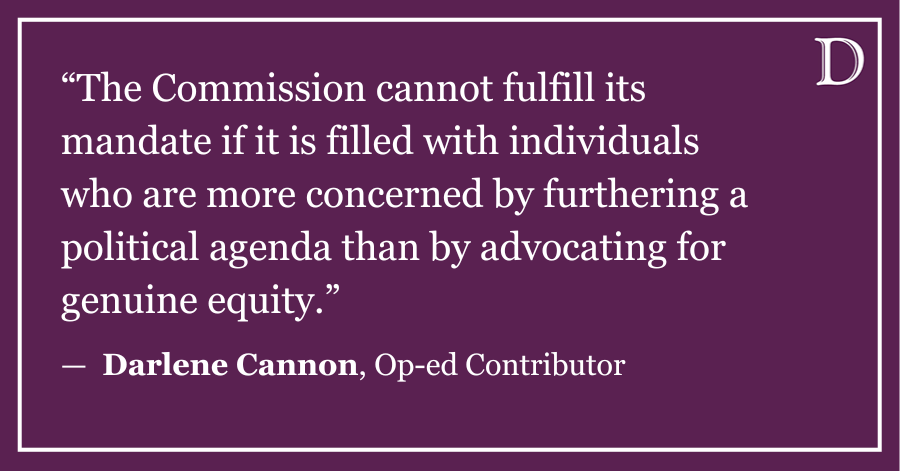In the aftermath of a stand-off between pro-Palestine and pro-Israel demonstrators at the Deering Meadow encampment on the morning of Sunday, April 28, those at the “Northwestern Liberation Zone” formed a human chain to prevent counterprotesters from entering the space they had occupied for the previous four days.
As I walked by this scene, I heard a chant that made me snap into focus. “Brick by brick, wall by wall, Israel will fall,” the protesters exclaimed in unison.
The irony of chanting about tearing down walls while literally forming a wall designed to keep out ideological opponents was glaring. Four days into this great anarchist experiment ostensibly built around inclusion and mutual aid, the protesters had enacted border controls.
This hypocrisy is emblematic of what the NU encampment became. While the protesters claimed to be staging a peaceful and liberating act of solidarity — and it very well may have felt that way from within the encampment — the result was the construction of a space that served to intimidate those with differing views, especially Jewish students.
Beyond the forming of a human chain, two Jewish students observing the encampment were told that “Zionists are not welcome here,” journalists were attacked and blocked from filming the protest, and a Jewish student photographing the encampment was publicly shamed by a protester over a loudspeaker.
These incidents illustrate a persistent issue plaguing anti-Israel protests across the country. While many protesters may not arrive with nefarious intentions, encampments have proven themselves to be inherently hostile and exclusionary institutions.
In the most basic of terms, setting up an encampment requires occupying a plot of land that would ordinarily be open to all students and faculty. It requires controlling the flow of people and resources so that the encampment’s mission is not hijacked. And, in the case of anti-Israel encampments, this means imposing ideological litmus tests to prevent visibly Jewish and Zionist students from entering a space which they have the right to be in by virtue of attending the university.
We have seen a similar series of events play out at dozens of college campuses across the country. At UCLA, students were required to wear wristbands signifying their anti-Israel credentials to pass through a barricade on their way to class. At Yale, rows of tents were set up to block students from entering the encampment if they disagreed with the protesters’ political views. At Harvard, a sign posted at the encampment read, “make sure to talk to one of us before entering” the “Liberated Zone.”
When the same practices begin to emerge at each university encampment, it becomes increasingly clear that the ideological screening is central to their design. These checkpoints systematically discriminate against Jewish students who support Israel’s right to exist. Simply put, you do not have the right to create a “Zionist-free zone” on campus enforced through targeted harassment of anyone who appears to be Jewish or pro-Israel.
Tactics that use intimidation to scare off community members are antithetical to a culture of free expression, which is likely one of the reasons that University President Michael Schill chose to enact an interim addendum to the Student Code of Conduct on the morning of April 25 prohibiting the permanent pitching of tents.
Anticipating potential university policies, some claimed that regulating the time, place and manner of protests is a convenient ploy to suppress pro-Palestinian speech. In a Letter to the Editor published on April 24, 171 NU faculty members argued that the University would be abandoning its commitment to open debate “if it were to take any action to block our students’ rights to peaceful speech, assembly and dissent.”
What this statement overlooks is the University’s fundamental responsibility to ensure that one group’s speech does not impede another’s. Both public and private institutions are legally permitted to place restrictions on the time, place and manner of demonstrations so long as they are content-neutral and leave open other mediums for individuals to express their views.
Even the Chicago Principles — a document created by the University of Chicago in 2014 to promote unfettered free speech on its campus, which President Schill has said is a guiding framework for him — acknowledges that time, place and manner regulations are sometimes necessary “to ensure that it does not disrupt the ordinary activities of the University.”
While they should be implemented sparingly, rules dictating how one may or may not protest on a campus are critical to ensuring not only that a university can perform its basic functions, but also that all sides of an issue can speak freely without being harassed or shouted down. In the case of permanent encampments, both conditions have been impeded.
Although Schill initially followed this logic when crafting the addendum, his April 29 agreement with organizers to end the encampment in exchange for concessions on a series of demands demonstrates a lack of care for the principles of free speech in their most nuanced form.
Rather than attempting to enforce the rules that he himself clearly viewed as necessary, Schill negotiated in good faith with a group who used illiberal and discriminatory tactics to indefinitely seize a section of University property for only those who subscribe to certain political beliefs.
This response suggests that the University’s commitment to freedom of expression in practice does not prioritize the fostering of civil dialogue but rather allows the loudest and most inflammatory voices to shout down their peers with impunity.
Instead of moving NU toward more constructive discourse, the agreement will only send the message that restricting the use of shared space is a fruitful strategy, planting the seeds of a more confrontational, less governable speech climate on campus.
It is true that Schill’s de-escalatory approach succeeded in avoiding the worst potential outcomes of the encampment — either escalated violence between protesters and other members of the NU community or an invasive police response.
Nevertheless, the agreement sets a dangerous precedent: If you are loud enough, disruptive enough and create a hostile enough environment for your classmates, your blatant violations of University policy will be met not with discipline but with reward.
Eli Kronenberg is a Medill freshman. He can be contacted at [email protected]. If you would like to respond publicly to this op-ed, send a Letter to the Editor to [email protected]. The views expressed in this piece do not necessarily reflect the views of all staff members of The Daily Northwestern.

